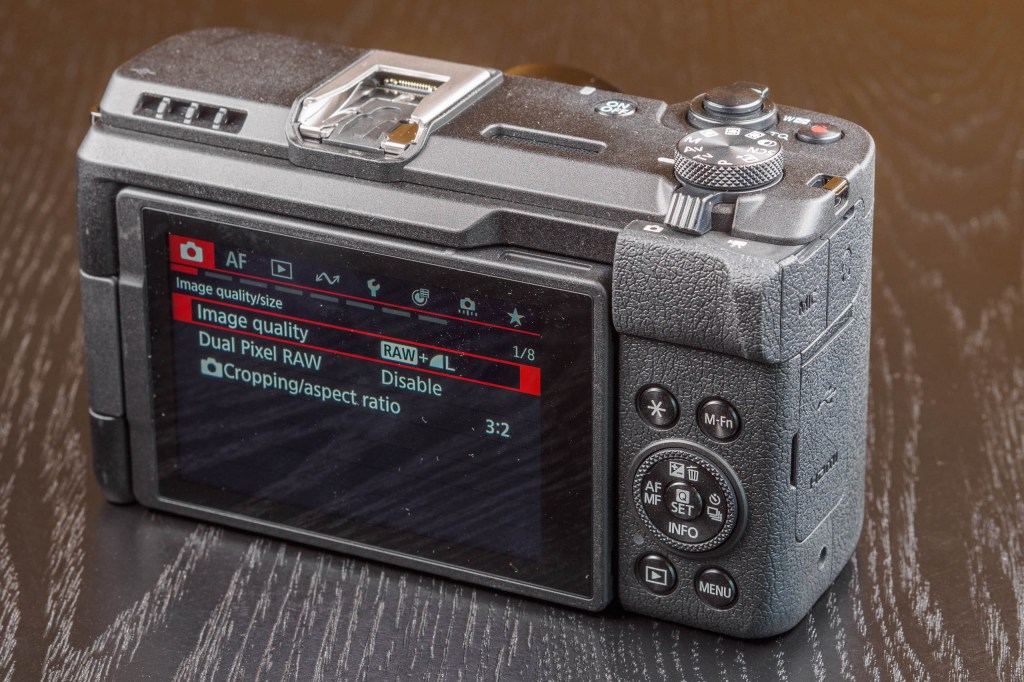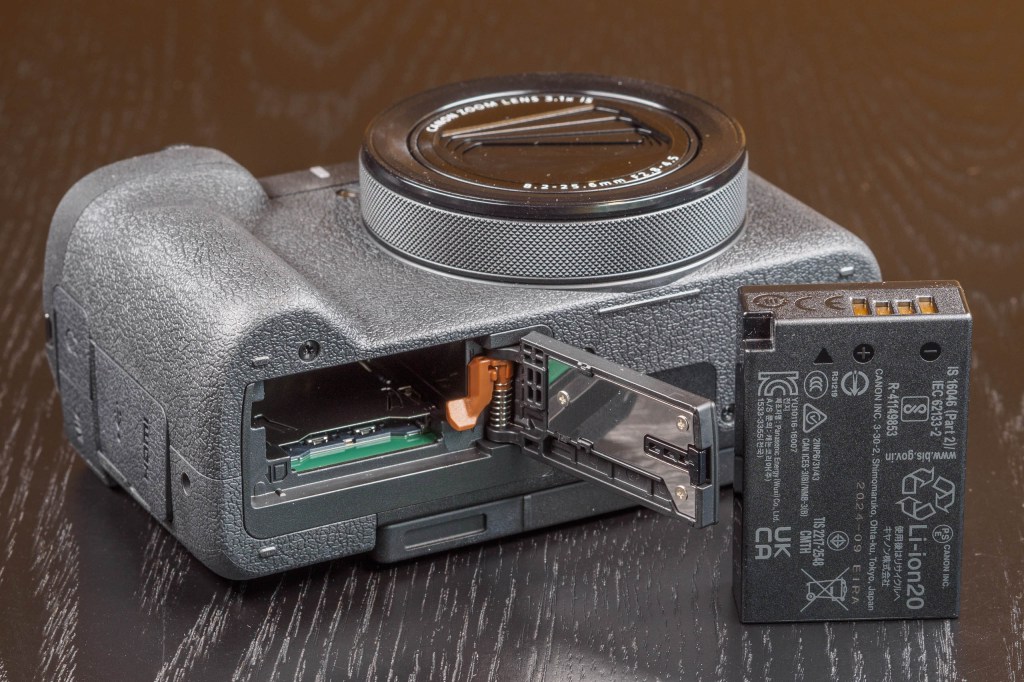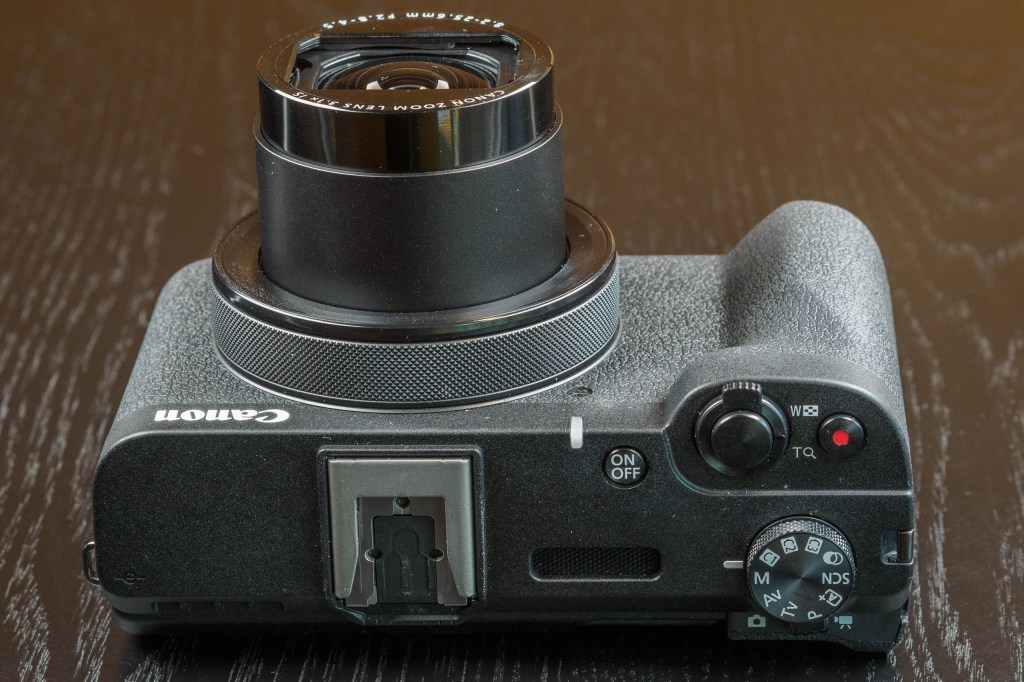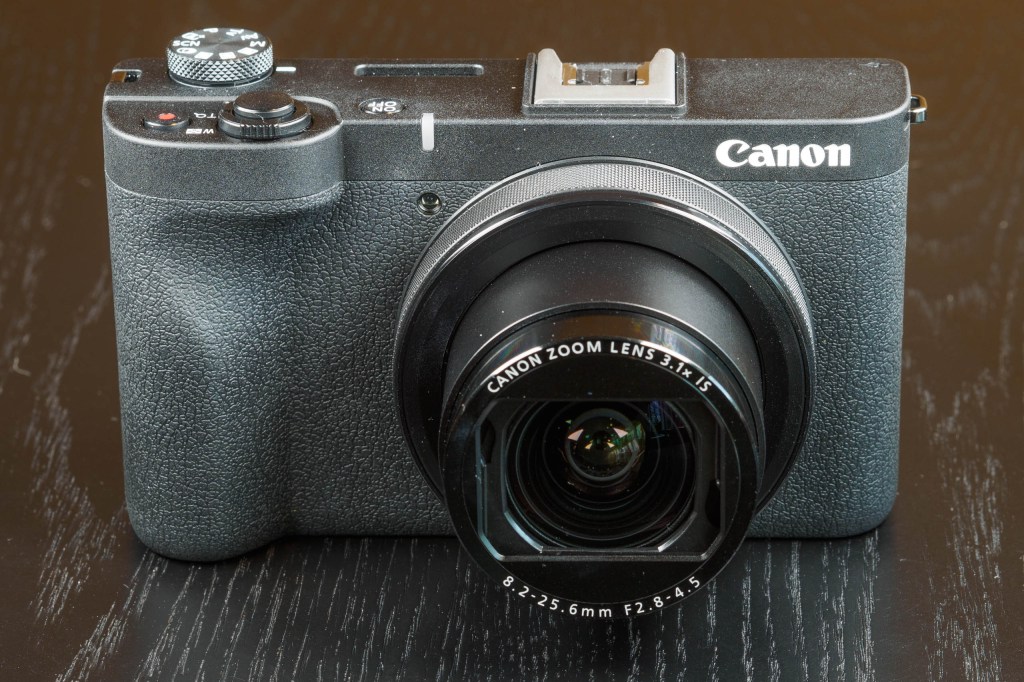Canon has introduced its first high-end compact camera with a fixed zoom lens in six years, the PowerShot V1. While at first glance it resembles the existing G7 X Mark III, that ‘V’ in the product name means that it’s very video-focused in comparison. But this certainly shouldn’t put off photographers, for whom it offers a unique feature set without sacrificing enthusiast-level control. It’s due in the shops from 10th April, for $899.99 / £959.99.
Canon PowerShot V1 at a glance:
- $899.99 / £959.99
- 22.3MP 1.4in-type sensor
- 16-50mm equivalent f/2.8-4.5 lens
- 3in, 1.04m-dot fully articulated touchscreen
- Up to 30 fps continuous shooting
- 4K 30p video (unlimited recording)
Notably, the 16-50mm equivalent zoom is the widest we’ve ever seen on a compact camera. While it should be great for arms-length vlogging, it’s also an intriguing proposition for photographers shooting such things as architecture or landscapes. As a bonus, the lens includes both optical image stabilisation and a switchable 3-stop neutral density filter.
Canon has employed an unusual sensor, too. Measuring 18.5 x 12.3mm, it appears to be a cropped-down, 22.3MP version of the 32.5MP chip from the EOS R7. This means it’s larger than the 1-in sensor used in the G7 X Mark III, so it should give better image quality. In fact it’s roughly the same size as a Four Thirds sensor, just with a 3:2 aspect ratio rather than 4:3.
For composing and viewing your shots, you get a vari-angle touchscreen than can be set facing almost any angle; up, down, or forwards for selfies and vlogging. That makes it more flexible than the G7 X III’s tilt-only unit. However, some will be disappointed to find that there’s no electronic viewfinder on board.
Subject detection autofocus is included for people and animals. Both microphone and headphone sockets are built-in, while Canon’s Advanced Shoe on top supports digital audio input with certain accessories.
Canon PowerShot V1: key features
- Lens: The ultra-wide 16-50mm equivalent zoom boasts both optical stabilisation and a switchable 3-stop ND filter
- Sensor: Canon has used a 22.3MP sensor measuring 18.5 x 12.3mm, with Dual Pixel CMOS AF II technology on board
- Cooling: Thanks to a built-in fan, Canon is promising 4K 30p recording times limited only by the available power and card space
- Windshield: A furry windshield for the built-in microphone is supplied in the box and slots onto the camera’s hot shoe
- Power: The LP-E17 battery is rated for 400 shots per charge, or 1 hour 10min video recording
- Storage: There’s a single UHS-II SD card slot for recording your files
Enthusiast-friendly design
Design-wise, the V1 will look instantly familiar to anyone who’s used a recent Canon advanced compact camera. It boasts a good set of external controls, along with a user interface that matches EOS R mirrorless cameras. This means it provides reasonably direct access to all the key shooting settings.
You get a proper mode dial on top, with a dedicated photo/video switch behind it. A large control dial around the lens operates smoothly with no click-stops. There’s also a tiny combined dial/d-pad on the back for changing settings and navigating the menus. Photographers should find this a welcome contrast to Sony’s ZV-series cameras, which are primarily set up for point-and-shoot vloggers.
At 118.3 x 68 x 52.5mm and 426g, the V1 is noticeably chunkier than most other zoom compacts. But it will still fit in a coat pocket. It fits nicely in your hand, with a grip that feels secure regardless of whether you’re pointing the camera forwards or back towards to you.
First impressions
It’s easy to see the PowerShot V1 as being primarily a video camera, and let’s be clear, that’s a significant part of its design. But from a couple of hours hands-on with it, I think Canon has done a great job of making a camera that photographers should enjoy using, too. It marks a very welcome return to form for the PowerShot line, and it will surely sell extremely well. Look out for our upcoming full review.
Read more about my experience of shooting with the Canon V1 here: I’ve been using the new Canon V1 compact camera and it’s not just for video
Related content:
- Canon EOS R50 V released: an APS-C mirrorless camera for video
- New Canon RF-S 14-30mm F4-6.3 IS STM PZ powerzoom lens
- Canon RF 20mm F1.4 L VCM announced: premium large-aperture wideangle prime
Follow AP on Facebook, X, Instagram, YouTube and TikTok.
Canon PowerShot V1 full specifications
| Sensor | 22.3MP CMOS, 18.5 x 12.3 |
| Output size | 5760×384 |
| Focal length mag | 1.95x |
| Lens | 8.2-25.6mm f/2.8-4.5 (16-50mm equivalent) |
| Shutter speeds | 30sec – 1/2000sec (mechanical); 30sec – 1/16,000sec (electronic) |
| Sensitivity | ISO 100-32,000; ISO 51,200 extended |
| Exposure modes | P, Av, Tv, M, Creative Auto |
| Metering | Evaluative, spot, centre-weighted average |
| Exposure comp | +/-3 EV in 0.3 EV steps |
| Continuous shooting | 15fps (mechanical shutter), 30fps (electronic shutter) |
| Screen | 3in 1.04m-dot vari-angle touchscreen |
| Viewfinder | None |
| AF points | 3431 |
| Video | 4K 60fps (cropped); 4K 30fps (full width); Full HD 120fps |
| External mic | 3.5mm stereo; Advanced shoe |
| Memory card | UHS-II SD |
| Power | LP-E17 Li-ion |
| Battery life | 400 shots / 1hr 10min video |
| Dimensions | 118.3 x 68.0 x 52.5 mm |
| Weight | 426g |











